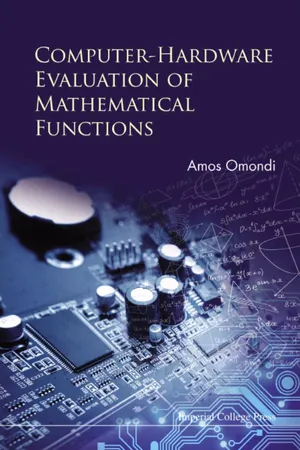
- 432 pages
- English
- ePUB (mobile friendly)
- Available on iOS & Android
Computer-hardware Evaluation Of Mathematical Functions
About this book
Computer-Hardware Evaluation of Mathematical Functions provides a thorough up-to-date understanding of the methods used in computer hardware for the evaluation of mathematical functions: reciprocals, square-roots, exponentials, logarithms, trigonometric functions, hyperbolic functions, etc. It discusses how the methods are derived, how they work, and how well they work. The methods are divided into four core themes: CORDIC, normalization, table look-up, and polynomial approximations. In each case, the author carefully considers the mathematical derivation and basis of the relevant methods, how effective they are (including mathematical errors analysis), and how they can be implemented in hardware.
This book is an excellent resource for any student or researcher seeking a comprehensive, yet easily understandable, explanation of how computer chips evaluate mathematical functions.
Computer-Hardware Evaluation of Mathematical Functions provides a thorough up-to-date understanding of the methods used in computer hardware for the evaluation of mathematical functions: reciprocals, square-roots, exponentials, logarithms, trigonometric functions, hyperbolic functions, etc. It discusses how the methods are derived, how they work, and how well they work. The methods are divided into four core themes: CORDIC, normalization, table look-up, and polynomial approximations. In each case, the author carefully considers the mathematical derivation and basis of the relevant methods, how effective they are (including mathematical errors analysis), and how they can be implemented in hardware.
This book is an excellent resource for any student or researcher seeking a comprehensive, yet easily understandable, explanation of how computer chips evaluate mathematical functions.
Readership: Graduate and undergraduate students and researchers interested in the hardware and software aspects of computer chips.
Key Features:
- First full-length book on the subject
- Contains up-to-date information
- Detailed and easy to use
Tools to learn more effectively

Saving Books

Keyword Search

Annotating Text

Listen to it instead
Information
Table of contents
- Cover
- Halfitle Page
- Title Page
- Copyright
- Dedication
- Preface
- Acknowledgements
- Contents
- 1. Errors, Range Reduction, and Rounding
- 2. Redundant Representations and High-Speed Arithmetic
- 3. CORDIC
- 4. High-Performance CORDIC
- 5. Normalization Algorithms
- 6. Polynomial and Rational-Function Approximations
- 7. Table Lookup and Segmented Polynomial Approximations
- 8. Reciprocals, Square Roots, and Inverse Square Roots
- References
- Index
Frequently asked questions
- Essential is ideal for learners and professionals who enjoy exploring a wide range of subjects. Access the Essential Library with 800,000+ trusted titles and best-sellers across business, personal growth, and the humanities. Includes unlimited reading time and Standard Read Aloud voice.
- Complete: Perfect for advanced learners and researchers needing full, unrestricted access. Unlock 1.4M+ books across hundreds of subjects, including academic and specialized titles. The Complete Plan also includes advanced features like Premium Read Aloud and Research Assistant.
Please note we cannot support devices running on iOS 13 and Android 7 or earlier. Learn more about using the app